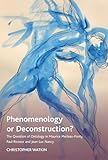Phenomenology or Deconstruction? : The Question of Ontology in Maurice Merleau-Ponty, Paul Ricoeur and Jean-Luc Nancy / Christopher Watkin.
Material type: TextPublisher: Edinburgh : Edinburgh University Press, [2022]Copyright date: ©2009Description: 1 online resource (288 p.)Content type:
TextPublisher: Edinburgh : Edinburgh University Press, [2022]Copyright date: ©2009Description: 1 online resource (288 p.)Content type: - 9780748637591
- 9780748637607
- online - DeGruyter
| Item type | Current library | Call number | URL | Status | Notes | Barcode | |
|---|---|---|---|---|---|---|---|
 eBook
eBook
|
Biblioteca "Angelicum" Pont. Univ. S.Tommaso d'Aquino Nuvola online | online - DeGruyter (Browse shelf(Opens below)) | Online access | Not for loan (Accesso limitato) | Accesso per gli utenti autorizzati / Access for authorized users | (dgr)9780748637607 |
Frontmatter -- Contents -- Acknowledgements -- Abbreviations -- Introduction -- 1. Maurice Merleau-Ponty: Perception -- 2. Maurice Merleau-Ponty: Language -- 3. Paul Ricoeur: Selfhood -- 4. Paul Ricoeur: Justice -- 5. Jean-Luc Nancy: Sense -- 6. Jean-Luc Nancy: Plurality -- Concluding Remarks -- Bibliography and Further Reading -- Index
restricted access online access with authorization star
http://purl.org/coar/access_right/c_16ec
Phenomenology or Deconstruction? challenges traditional understandings of the relationship between phenomenology and deconstruction through new readings of the work of Maurice Merleau-Ponty, Paul Ricœur and Jean-Luc Nancy. A constant dialogue with Jacques Derrida's engagement with phenomenological themes provides the impetus to establishing a new understanding of 'being' and 'presence' that exposes significant blindspots inherent in traditional readings of both phenomenology and deconstruction. In reproducing neither a stock phenomenological reaction to deconstruction nor the routine deconstructive reading of phenomenology, Christopher Watkin provides a fresh assessment of the possibilities for the future of phenomenology, along with a new reading of the deconstructive legacy. Through detailed studies of the philosophy of Merleau-Ponty, Ricœur and Nancy, he shows how a phenomenological tradition much wider and richer than Husserlian or Heideggerean thought alone can take account of Derrida's critique of ontology and yet still hold a commitment to the ontological. This new reading of being and presence fundamentally re-draws our understanding of the relation of deconstruction and phenomenology, and provides the first sustained discussion of the possibilities and problems for any future 'deconstructive phenomenology'.
Mode of access: Internet via World Wide Web.
In English.
Description based on online resource; title from PDF title page (publisher's Web site, viewed 29. Jun 2022)


